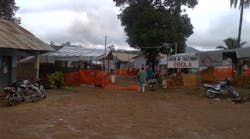At a news briefing on Sept. 2 and during an interview on CNN’s “New Day” program, the director of the Centers for Disease Control and Prevention (CDC) said the Ebola outbreak in West Africa “is spiraling out of control.”
According to Dr. Tom Frieden, some efforts – such as closing borders and restricting flights in order to stop the spread of the disease – only are making the outbreak worse by limiting the ability of groups like CDC and the World Health Organization (WHO) to move supplies and aid personnel into the affected countries. As of Aug. 26, WHO had reported 3,069 suspect and confirmed cases of Ebola in Liberia, Guinea, Sierra Leone, Nigeria and Senegal, including 1752 laboratory-confirmed cases, and 1552 deaths. The fatality rate varies from country to country, according to WHO, ranging from 55 percent to 75 percent.
In a blog posted Aug. 22 titled, “Why I Am Going To Africa,” Frieden wrote: “The Ebola outbreak in West Africa is a tragic and painful reminder that global health security has a direct impact on the health of all of us here in the United States. Infectious diseases do not recognize borders. Uncontrolled disease anywhere is potentially a threat everywhere.”
In his blog, Frieden talked about CDC workers who are in West Africa, working with community health organizations and tribal leaders to try to control the outbreak:
“CDC disease detective Kelsey Mirkovic, just back from West Africa, tells of working to gain the confidence of village leaders and train community health workers to spread the word about how to avoid getting – and stop spreading – Ebola," said Frieden.
He quoted Mirkovic as saying, "The community health workers are key in the effort to stop Ebola because they are working with people in their villages every day. But if they meet with resistance, it's the village chief who can make the difference."
Added Frieden: "An encounter in one village, resolved with the help of the chief, taught Kelsey valuable lessons in how to reach people and communicate more effectively. A grateful chief presented Kelsey with a symbolic gift of cocoa pods and a coffee plant. For her, the gift symbolized the important connection made and confidence gained with a trusted community leader.”
CDC highlights a number of what it calls “disease detectives” on its web site. One, referred to only as Greg, originally trained as a Navy diver and now works for CDC and is an officer in the U.S. Public Health Service. He has worked on several potentially dangerous diseases, including Leishmaniasis, H1N1 influenza, MRSA and Rocky Mountain spotted fever.
He is just one of the more than 50 disease experts CDC has deployed to Africa during the past few weeks to help bring the largest Ebola outbreak in history under control. This is Greg’s third time back to West Africa. He previously lived in Ghana for three years working on infectious disease studies and surveillance, and before that, he was in Kenya working on famine response.
This time around, he is going to help with the enormous task of contact tracing for the Ebola outbreak. Contact tracing is at the heart of efforts to control this deadly virus. It involves interviewing a patient with Ebola to identify everyone they have come in contact with since their symptoms began. Then each contact must be followed for 21 days. If even one contact is missed, there is a risk for further spread.
Greg is as aware of the risk of non-action as he is of his own personal risk. “Being safe and careful are guiding principles of our mission to stop the spread of Ebola,” he said. “My short-term goal is to help do the basics of public health epidemiology – preventing the spread through contact tracing – with the long- term goal of ending the outbreak. It will happen, but only through painstaking hard work.”
While the only cases of Ebola infection occurring outside of Africa are the result of laboratory mishaps, Dr. David Kuhar, a CDC medical officer, videotaped a segment of the CDC Expert Video Commentary series on Medscape in which he discussed what healthcare facilities can do to prepare for a patient with Ebola virus disease and the infection control procedures that need to be in place in U.S. hospitals.
“The recent Ebola virus disease outbreak in West Africa has increased the possibility of patients traveling from the affected countries to the United States,” said Kuhar, adding, “Healthcare providers should consider Ebola as a diagnosis when patients have traveled to affected areas within the past three weeks and report such symptoms as fever, joint or muscle aches, diarrhea, vomiting, weakness, stomach pain or lack of appetite.”
According to Frieden, the best way to protect U.S. citizens and healthcare workers from the Ebola virus is to get its spread under control in Africa.
“When we invest the time and resources to help other countries protect their own people, we help protect Americans, too,” Frieden wrote in his blog. “We want to do everything in our power to help stop this outbreak. We will protect people around the world, including in the United States, by stopping Ebola at its source.”



